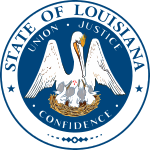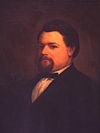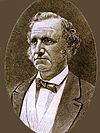
The 1864 United States presidential election, the 20th quadrennial presidential election, was held on Tuesday, November 8, 1864. Near the end of the American Civil War, incumbent President Abraham Lincoln of the National Union Party easily defeated the Democratic nominee, former General George B. McClellan, by a wide margin of 212–21 in the electoral college, with 55% of the popular vote. For the election, the Republican Party and some Democrats created the National Union Party, especially to attract War Democrats.

The Red River Campaign, also known as the Red River Expedition, was a major Union offensive campaign in the Trans-Mississippi Theater of the American Civil War which took place from March 10 to May 22, 1864. It was launched through the densely forested gulf coastal plain region between the Red River Valley and central Arkansas towards the end of the war. The offensive was intended to stop Confederate use of the Louisiana port of Shreveport, open an outlet for the sugar and cotton of northern Louisiana, and to split the Confederate lines, allowing the Union to encircle and destroy the Confederate military forces in Louisiana and southern Arkansas. It marked the last major offensive attempted by the Union in the Trans-Mississippi Theater.

The 38th United States Congress was a meeting of the legislative branch of the United States federal government, consisting of the United States Senate and the United States House of Representatives. It met in Washington, D.C. from March 4, 1863, to March 4, 1865, during the last two years of the first administration of U.S. President Abraham Lincoln. The apportionment of seats in the House of Representatives was based on the Eighth Census of the United States in 1860. The Senate had a Republican majority, and the House of Representatives had a Republican plurality.

The National Union Party was the temporary name used by the Republican Party and elements of other parties for the national ticket in the 1864 presidential election that was held during the Civil War. For the most part, state Republican parties did not change their name. The temporary name was used to attract War Democrats, border state voters, and Unconditional Unionist and Unionist Party members who might otherwise have not voted for the Republican Party. The party nominated incumbent Republican President Abraham Lincoln and Democrat Andrew Johnson for Vice President, who won the electoral college 212–21.

John Edward Bouligny was an American politician who was a member of the U.S. House of Representatives representing the state of Louisiana. He served one term as a member of the Know Nothing movement's anti-immigrant American Party. During his term, Louisiana seceded from the Union, but Bouligny remained in Washington and refused to resign. He was the only member of Congress from Louisiana to not resign or vacate his seat after the state seceded.

Jacob Hale Sypher was an attorney and politician, elected as a member of the U.S. House of Representatives representing Louisiana. He served four terms as a Republican, after having served in the Union Army during the American Civil War.

Louisiana Constitutional Amendment 1 of 2004, is an amendment to the Louisiana Constitution that makes it unconstitutional for the state to recognize or perform same-sex marriages or civil unions. The referendum was approved by 78% of the voters.

Louisiana was a dominant population center in the southwest of the Confederate States of America, controlling the wealthy trade center of New Orleans, and contributing the French Creole and Cajun populations to the demographic composition of a predominantly Anglo-American country. In the antebellum period, Louisiana was a slave state, where enslaved African Americans had comprised the majority of the population during the eighteenth-century French and Spanish dominations. By the time the United States acquired the territory (1803) and Louisiana became a state (1812), the institution of slavery was entrenched. By 1860, 47% of the state's population were enslaved, though the state also had one of the largest free black populations in the United States. Much of the white population, particularly in the cities, supported slavery, while pockets of support for the U.S. and its government existed in the more rural areas.
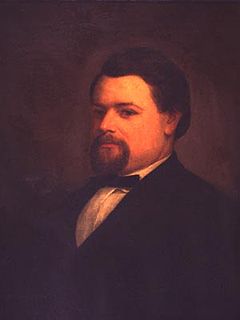
George Michael Decker Hahn, was an attorney, politician, publisher and planter in New Orleans, Louisiana. He served twice in Congress during two widely separated periods, elected first as a Unionist Democratic Congressman in 1862, as a Republican to the U.S. Senate in 1865, and later as a Republican to the U.S. House of Representatives in 1884. He was elected as the 19th Governor of Louisiana, serving from 1864 to 1865 during the American Civil War, when the state was occupied by Union troops. He was the first German-born governor in the United States, and is also claimed as the first ethnic Jewish governor. By that time he was a practicing Episcopalian.

James Madison Wells was elected Lieutenant Governor and became the 20th Governor of Louisiana during Reconstruction.
The New Orleans Tribune was a newspaper serving the African-American community of New Orleans, Louisiana. It was the first Black daily newspaper in the United States.
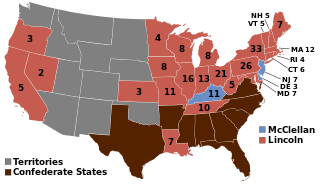
The 1864 United States elections were held on November 8, 1864. National Union President Abraham Lincoln was elected to a second term, while the Republicans added to their majorities in Congress. The elections were held during the American Civil War. Lincoln would be assassinated shortly into his second term.

The 1866 United States elections occurred in the middle of National Union/Democratic President Andrew Johnson's term, during the Third Party System and Reconstruction. Johnson had become president on April 15, 1865, upon the death of his predecessor, Abraham Lincoln. Members of the 40th United States Congress were chosen in this election. As this was the first election after the Civil War, many ex-Confederates were barred from voting, and several Southern states did not take part in the election. Delegations from Arkansas, Florida, Alabama, North Carolina, Louisiana, and South Carolina were re-admitted during the 40th Congress.

The 1865 Louisiana gubernatorial election was the second election to take place under the Louisiana Constitution of 1864. As a result of this election James Madison Wells was re-elected Governor of Louisiana. The result was a lopsided victory for Wells because many whites, who supported the Democratic Party, remained disqualified due to their support of the Confederacy. Nonetheless Democrats nominated fugitive former Governor Henry Watkins Allen.

Following is a table of United States presidential elections in Louisiana, ordered by year. Since its admission to statehood in 1812, Louisiana has participated in every U.S. presidential election except the election of 1864, during the American Civil War. At that time, Louisiana was controlled by the Union and held elections, but electors were not ultimately counted.
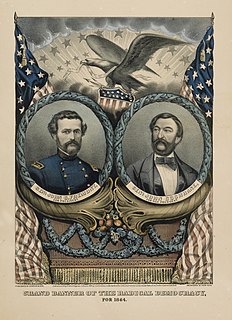
The Radical Democracy Party was an abolitionist and anti-Confederate political party in the United States. The party was formed to contest the 1864 presidential election and it was made up largely of disaffected Radical Republicans who felt that President Abraham Lincoln was too moderate on the issues of slavery and racial equality. John C. Frémont was nominated as the party's presidential candidate, with John Cochrane as his running mate. However, their campaign failed to gain momentum and not wanting to act as a spoiler against Lincoln, they withdrew from the race in September.

The 1864 United States presidential election in Louisiana took place on November 8, 1864, as part of the 1864 United States presidential election.

The 1864 United States presidential election in Tennessee took place on November 8, 1864, as part of the 1864 United States presidential election. The state legislature chose 10 electors to the Electoral College, who voted for president and vice president.

The 1864 Maryland gubernatorial election took place on November 8, 1864. Incumbent Union Party Governor Augustus Bradford did not run for re-election. Union Party candidate Thomas Swann defeated Democratic candidate Ezekiel F. Chambers.
